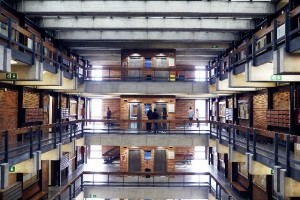UB School of Economics researchers launch multiple initiatives to study the spread and socio-economic impact of COVID-19
 The COVID-19 pandemic has raised a lot of questions, not all of them are directly related to health. Economists also have a key role to play in this crisis. In this context, many UB School of Economics researchers have reacted quickly and have started to search answers for some of these questions. Some of their initiatives have focused on the analysis of the spread of the virus, while other assess the social and economic impact of the pandemic.
The COVID-19 pandemic has raised a lot of questions, not all of them are directly related to health. Economists also have a key role to play in this crisis. In this context, many UB School of Economics researchers have reacted quickly and have started to search answers for some of these questions. Some of their initiatives have focused on the analysis of the spread of the virus, while other assess the social and economic impact of the pandemic.
Research initiatives that focus on the spread of the COVID-19
The Regional Quantitative Analysis Group (AQR) has published a series of documents that analyse the effects of different local factors in the spread of COVID-19 in Catalonia. More specifically, AQR researchers have studied the effects of the population density, meteorological conditions, socioeconomic situation, air pollution and the spatio-temporal evolution of the COVID-19. Until now, five letters have been published. The UB School of Economics researchers Josep Lluís Carrion-i-Silvestre, Antonio di Paolo, Alicia García, Enrique López-Bazo, Jordi López-Tamayo, Alessia Matano, Rosina Moreno, Ernest Pons, Raul Ramos, Vicente Royuela and Jordi Suriñach are directly involved in the production of these documents.
Research initiatives that focus on the social and economic impact of COVID-19
The Barcelona Institute of Economics (IEB) has published three analyses on the impact of COVID-19 in the framework of the Info IEB series. These are brief informative summaries of studies conducted at the institute. Firstly, José María Durán and Alejandro Esteller published the document “Coronavirus and public finances: Let’s do whatever it takes”. This was followed by Gemma García and Esteban Sanromá’s “Effect of the COVID-19 crisis on employment in the spanish economy”. Finally, Antoni Garrido published “Banking and Covid-19”.
In addition, the IEB researchers Dirk Foremny, Pilar Sorribas-Navarro and Judit Vall Castelló have published the working paper “Living at the Peak: Health and Public Finance During the Covid-19 Pandemic” which suggest that preferences for health care expenditures in Spain have almost doubled due to the COVID-19 health crisis.
On the other hand, the Institutions and Political Economy Research Group (IPERG) researchers Francesc Amat, Albert Falcó-Gimeno and Jordi Muñoz and the Barcelona Institute of Economics (IEB) researcher Andreu Arenas have published the working paper “Pandemics meet democracy. Experimental evidence from the COVID-19 crisis in Spain” in which they study citizens’ responses to these democratic dilemmas and also document the initial switch in mass public preferences towards technocratic and authoritarian government caused by the pandemic.
Finally, the Research Group on Governments and Markets (GiM) Lídia Farré together with the Pompeu Fabra University researcher Libertad González are working on a study that will help understand the situation of households during the period of confinement due to the coronavirus. In particular, they are analysing how people with children are adapting to this situation in terms of their work activity and household chores, with particular attention to gender inequalities. Under the title “The impact of COVID-19 on work and time-use in the family”, it has been one of 15 selected projects out of 350 that will receive a research grant under the IZA Coronavirus Emergency Research Thrust programme.
Recent news
- Four Researchers from the UB School of Economics awarded by the State Research Agency
- 24 Researchers join the UB School of Economics in 2023 and early 2024
- The 5centims.cat blog presents its article 250 at the faculty of Economics and Business
- "A Multidisciplinary Approach Is Essential for Understanding Poverty Dynamics and Economic Policies"
- Two UB School of Economics PhD Students awarded with SEBAP Mobility Grants
- Apply for the PhD in Economics with entry funding opportunities for 2024-2025 academic year
- AGAUR Awards Grant to UB School of Economics for Climate Change Research
- The UB improves positions and is listed among the top 100 universities worldwide in the Webometrics ranking
- Citizens would only give up free elections in exchange for a threefold increase in income, according to research by the UB

Sorry, the comment form is closed at this time.